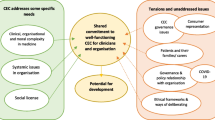Abstract
The purpose of this study was to assess the presence of ethics committees in rural critical access hospitals across the United States. Several studies have investigated the presence of ethics committees in rural health care facilities. The limitation of these studies is in the definition of ‘rural hospital’ and a regional or state focus. These limitations have created large variations in the study findings. In this nation-wide study we used the criteria of a critical access hospital (CAH), as defined by the Medicare Rural Hospital Flexibility Program (Flex Program, 2007), to bring consistency and clarity to the assessment of the presence of ethics committees in rural hospitals. The Flex Monitoring Team conducted a national telephone survey of 381 CAH administrators throughout the United States. The survey covered a wide variety of questions concerning hospitals’ community benefit, impact activities, and whether the hospital had a formally established an ethics committee. About 230 (60%) of the respondents indicated they had a formally established ethics committee or ethics consultation program at their CAH. The prevalence of ethics committees declined as the CAH location became increasingly rural along a rural–urban continuum. Unlike CAHs, all rural Department of Veterans Affairs Medical Centers have ethics committees. The results of this study provide an understanding of the limited presence of ethics committee in rural America and the need to consider new approaches for providing ethics assistance. A virtual ethics committee network may be the most efficient and effective way of providing rural hospitals access to a knowledgeable ethics committee or consultant.

Similar content being viewed by others
References
Bennett, K. J., Olatosi, B., & Probst, J. C. (2008). Health disparities: A rural-urban chartbook. Columbia: South Carolina Rural Health Research Center.
Brasure, M., Stensland, J., & Wellever, A. (2000). Quality oversight: Why are rural hospitals less likely to be JCAHO accredited? The Journal of Rural Health, 16(4), 324–336.
Cook, A. F., & Hoas, H. (2000). Where the rubber hits the road: Implications for organizational and clinical ethics in rural health care settings. HEC Forum, 12(4), 331–340.
Cook, A. F., & Hoas, H. (2001). Voices from the margins: A context for developing bioethics-related resources in rural areas. The American Journal of Bioethics, 1(4), W12.
Cook, A. F., & Hoas, H. (2006). Re-framing the question: What do we really want to know about rural healthcare ethics? The American Journal of Bioethics, 6(2), 51–53.
Cook, A. F., Hoas, H., & Guttmannova, K. (2000). Bioethics activities in rural hospitals. Cambridge Quarterly of Healthcare Ethics, 9(2), 230–238.
Fox, E., Crigger, B., Bottrell, M., & Bauck, P. (2007). Integrated ethics: Improving ethics quality in health care. [On-line] Available: http://www.ethics.va.gov/docs/integratedethics/Ethical_Leadership_Fostering_an_Ethical_Environment_and_Culture_20070808.pdf (Accessed February 25, 2010).
Fox, E., Myers, S., & Pearlman, R. A. (2007b). Ethics consultation in United States hospitals: A national survey. The American Journal of Bioethics, 7(2), 13–25.
Having, K. M., Hale, D., & Lautar, C. J. (2008). Ethics committees in the rural Midwest: Exploring the impact of HIPAA. The Journal of Rural Health, 24(3), 316–320.
Institute of Medicine. Committee on Quality of Health Care in America. (2001). Crossing the quality chasm: A new health system for the 21st century. Washington, DC: National Academy Press.
Milmore, D. (2006). Hospital ethics committees: A survey in Upstate New York. HEC Forum, 18(3), 222–244.
National Rural Health Association. (2007). What’s different about rural health care. [On-line] Available: http://ruralhealthweb.org/go/left/about-rural-health (Accessed February 25, 2010).
Nelson, W. (2006). Where is the evidence: A need to assess rural ethics committee models. The Journal of Rural Health, 22(3), 193–195.
Nelson, W. A., (Ed.). (2009). Handbook for rural health care ethics: A practical guide for professionals. Available from http://dms.dartmouth.edu/cfm/resources/ethics/.
Nelson, W., Greene, M. A., & West, A. (2010). Rural health care ethics: No longer the forgotten quarter. Cambridge Quarterly of Healthcare Ethics, 19(4), 510–517.
Nelson, W., Lushkov, G., Pomerantz, A., & Weeks, W. B. (2006). Rural health care ethics: Is there a literature? The American Journal of Bioethics, 6(2), 44–50.
Nelson, W. A., Neily, J., Mills, P., & Weeks, W. B. (2008). Collaboration of ethics and patient safety programs: Opportunities to promote quality care. HEC Forum, 20(1), 15–27.
Nelson, W., Rosenberg, M. C., Weiss, J., & Goodrich, M. (2009). New Hampshire critical access hospitals: CEOs’ report on ethical challenges. Journal of Healthcare Management, 54(4), 273–283, discussion 283–274.
Nelson, W., & Weeks, W. B. (2006). Rural and non-rural differences in membership of the American Society of Bioethics and Humanities. Journal of Medical Ethics, 32(7), 411–413.
Pope, T. M. (2008). Multi-institutional ethics committees: For rural hospitals, and urban ones too. The American Journal of Bioethics, 8(4), 69–71.
Ricketts, T. C. (2005). Workforce issues in rural areas: A focus on policy equity. American Journal of Public Health, 95(1), 42–48.
Rural Assistance Center. (2009). Critical access hospitals. [On-line] Available: http://www.raconline.org/info_guides/hospitals/cah.php (Accessed February 25, 2010).
Washington State Department of Health. (2009). Rural health research. [On-line] Available: http://www.doh.wa.gov/hsqa/ocrh/har/hcresrch.htm (Accessed February 25, 2010).
Weeks, W. B., Kazis, L. E., Shen, Y., Cong, Z., Ren, X. S., Miller, D., et al. (2004). Differences in health-related quality of life in rural and urban veterans. American Journal of Public Health, 94(10), 1762–1767.
Acknowledgments
This work was partially supported by the Veterans Rural Health Resource Center—Eastern Region, White River Junction, Vermont. The views expressed in this article do not necessarily represent the Department of Veterans Affairs or the United States government. We gratefully acknowledge Dr. Andrew Coburn, Mr. John Gale and their colleagues at the Maine Rural Health Research Center at the University of Southern Maine for gathering the data used in this research paper. We also acknowledge the assistance of Mary Ann Greene, MS in providing bibliographic research assistance.
Author information
Authors and Affiliations
Corresponding author
Rights and permissions
About this article
Cite this article
Nelson, W.A., Rosenberg, MC., Mackenzie, T. et al. The Presence of Ethics Programs in Critical Access Hospitals. HEC Forum 22, 267–274 (2010). https://doi.org/10.1007/s10730-010-9134-5
Published:
Issue Date:
DOI: https://doi.org/10.1007/s10730-010-9134-5



